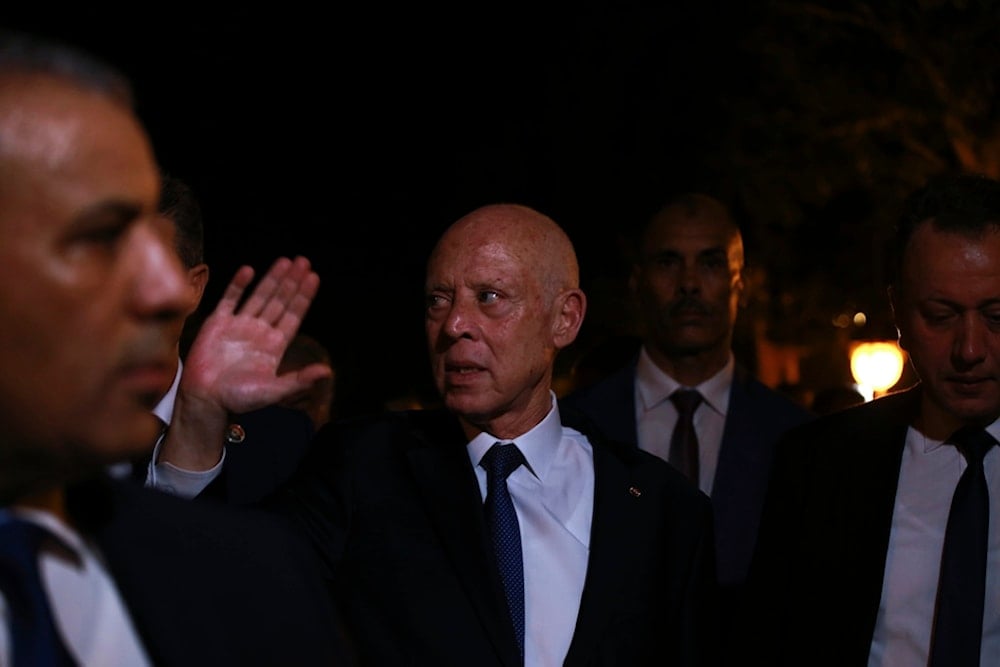Saied reaffirms Tunisia’s unwavering support for Palestinian people
The Tunisian president also expresses Tunisia’s solidarity with the Lebanese people, whom he said continue to face the brutal aggression of the Israeli regime.
-

Tunisian president and candidate for re-election Kais Saied joins his supporters after the announcement of the provisional results for the presidential elections, in the capital Tunis, Tunisia, Sunday, October 6, 2024. (AP)
Tunisian President Kais Saied reaffirmed on Monday Tunisia’s unwavering support for the Palestinian people, who are subjected to heinous crimes daily, according to a statement posted by the Tunisian presidency on social media.
During his meeting with Foreign Minister Mohamed Ali Nafti, Saied stressed that both the official and public Tunisian stance is clear: the solution lies in the liberation of all of Palestine and the establishment of an independent Palestinian state with al-Quds as its capital.
He underscored that rights cannot be obliterated by bombings or missiles, nor will they ever be erased by the passage of time, stressing that the people's desire for freedom will never be defeated.
In addition, Saied expressed Tunisia’s solidarity with the Lebanese people, whom he said continue to face the brutal aggression of the Israeli regime, which perpetrates daily atrocities under the watch of the international community.
Tunisia rejects any interference in internal affairs
In the same context, the Tunisian president reaffirmed his country's foreign policy principles, emphasizing Tunisia’s firm stance on rejecting any interference in its internal affairs.
Just as Tunisia refrains from meddling in the affairs of other nations, it will not tolerate any foreign interference on its own, he underlined, affirming that Tunisia is a free, independent, and sovereign state.
He further mentioned that Tunisia’s diplomatic policy is based on equal relations with all countries, emphasizing that the sovereignty of a nation is an immutable principle that cannot be measured by its size or population.
On another note, Saied emphasized the need to intensify efforts within Tunisia’s diplomatic and consular missions abroad, particularly regarding the prompt provision of services to Tunisians living overseas.
He stressed that many services that could be delivered in a short period are often delayed, causing unnecessary hardship for citizens in terms of travel and waiting times.
Lastly, Saied called for continued collaboration with all relevant countries to find lasting solutions to the issue of irregular migration.
He asserted that Tunisia is not the cause of this phenomenon but is one of its victims, making it clear that the country will not accept being used as either a transit point or a destination for anyone outside the framework of the law.
Saied's statement comes a couple of days after Tunisia's Independent High Authority for Elections confirmed that he has been re-elected for a second term.
During a press conference to announce the final results, Farouk Bouasker, head of the Independent High Authority for Elections in Tunisia, congratulated Saied on his win, noting that he received 90.69% of the votes.
Bouasker highlighted that voter turnout reached 2,704,155 voters, representing 27.7%, which is the lowest since the 2011 uprising that led to the ousting of longtime President Zine El Abidine Ben Ali.
He stated that "the commission did not receive any appeals against the preliminary results of the presidential elections held on October 6th," adding that "the elections marked a historic event, and the process went smoothly."
The election saw competition between three candidates: the outgoing president Kais Saied, imprisoned businessman Ayachi Zammel, and former parliament member Zouheir Maghzaoui.
According to official results, Zammel came in second with 7.35% of the vote, while Maghzaoui came in third with 1.97%.
Read more: Morocco, Algeria, Tunisia march in solidarity with Palestine

 4 Min Read
4 Min Read








